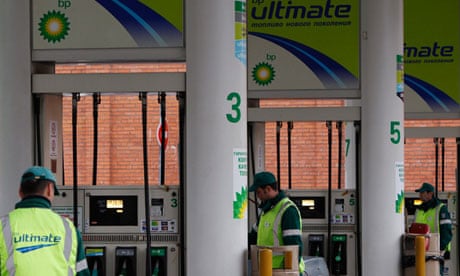BP has rewarded "very patient" shareholders and pension funds buffeted by the group's travails in the wake of the Deepwater Horizon disaster with a double-digit increase in its dividend.
A week after announcing the $27bn (£17bn) sale of its 50% stake in Russian business TNK-BP to the Kremlin-controlled Rosneft, the British oil group said it would increase its third-quarter dividend to 9¢ a share – a rise of 12.5% – in a move that goes some way to reasserting BP's status in pension fund portfolios. At its height, the BP investor payout accounted for £1 in every £6 of FTSE 100 dividend payments. But even at 9¢ it remains below its pre-Deepwater level of 14¢ in 2010, after which it was suspended for three successive quarters until its reinstatement in early 2011 at half its previous level. BP shares closed 4.2% higher at 442.85p. The stock remains about 30% below the 658p level that it was trading at shortly before the world's worst offshore spill, which saw 4.9m barrels of oil gush into the Gulf of Mexico.
BP's chief executive, Bob Dudley, said the dividend move was a reaction to the Rosneft deal, the development of new oil and gas prospects, and a post-Deepwater disposal programme that has nearly reached its $38bn target.
"We recognise that we have had some very patient shareholders. It is a combination of divestments, projects coming on stream and some clarity in Russia, that gave the board the confidence to reward our shareholders this quarter," he said. At 14¢ a quarter the BP dividend contributed around $10bn a year to pension funds, with the new 9¢ representing an annualised payment of about $6.8bn.
The National Association of Pension Funds, which represents 1,300 schemes with assets totalling £900bn, said it welcomed the move. "BP is a big company and a key holding for investors, so this rise in their dividend will be welcomed by many pension funds. It is also an encouraging indicator of the long-term health of the company," said David Paterson, head of corporate governance at the NAPF.
BP's third-quarter underlying replacement profit of $5.2bn – a figure that strips out fluctuations in oil prices – beat forecasts by more than $1bn, but represented a decline of 5% on the same period last year due to a number of divestments made by BP over the past 12 months.
Dudley added that BP was undaunted by a succession of bruising encounters with Russian geopolitics, which include Dudley's experience as boss of TNK-BP in 2008, when he was forced to quit after an "orchestrated campaign of harassment". Dudley said: "We have always had a good relationship with Rosneft … there is a very clear commitment to create and build a modern and efficient, world-class company." BP will emerge from the TNK-BP deal with an 18.5% stake in Rosneft. Acknowledging BP's fractious relationship with TNK-BP's co-owners, a group of oligarchs called AAR, he added: "The relationship seems to have run its course and BP did not want to leave Russia."
BP said its results were boosted by a strong performance in its downstream business, driven by improved profitability at its refining units, while its upstream business – oil and gas production – produced a similar performance to the previous quarter. BP's US refineries have struggled for profitability in recent years but problems at rival refiners, including Exxon's Beaumont facility, helped boost profits over the past three months. In the wake of the Gulf of Mexico spill, which has cost BP $38.1bn so far, the group has outlined a 10-point strategy that includes developing more profitable oil and gas fields. With that target in mind, the majority of BP's significant new projects that are due to come into production by 2014 are in four areas: the Gulf of Mexico, Angola, Azerbaijan and the North Sea. "All of these projects are on track," said BP.
As part of its post-spill strategy to slim down the group and raised compensation funds, BP has divested $35bn worth of businesses including $11bn in disposals since the second quarter, led by its Texas City and Carson refineries in the US. BP said it will make a "final" payment of $860m into a $20bn Gulf of Mexico compensation fund. Excluding that $20bn fund, the group has paid out $15bn in compensation and clean-up costs so far. However, it is still negotiating a settlement with the US department of justice over criminal and civil offences. BP said: "Whilst [BP] is ready to settle on reasonable terms, a number of unresolved issues remain and there is significant uncertainty as to whether an agreement will ultimately be reached." According to reports, the DoJ could be seeking a settlement of at least $18bn, while BP is holding out for $15bn.




Comments (…)
Sign in or create your Guardian account to join the discussion